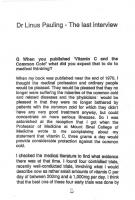Reflections on the New Biology (1968) by Linus Pauling
Linus Pauling , "Reflections on the new biology: Foreword." February 1968. UCLA Law Rev. 15, no. 2 (February 1
137 26 14MB
English Pages [6] Year 1968
Table of contents :
Eugenics for Alleviating Human Suffering
< 35 >
Beginning in 1962, about four years after Pauling's initial statements on genetic counseling, he promoted his first eugenics agenda. It was straightforward and got attention. His ultimate goal was to decrease human suffering by eliminating the factors that caused it; to this end, Pauling stated that molecular diseases, like sickle cell anemia, warranted legal intervention. He suggested two criteria. First, a law should require testing for sickle cell hemoglobin in African-Americans. Secondly, in an effort to eliminate sickle cell hemoglobin from the human population, marriage and procreation restrictions should be invoked. Accordingly, if one heterozygote and one homozygous dominant (i.e. a person with normal hemoglobin) marry, then there should be a limit on how many children they can have. If two heterozygotes marry then they should not be allowed to have children because there is a twenty-five percent chance that they will have a baby with sickle cell anemia. Coupling chance with concern for human suffering, Pauling advocated intervention from authorities: "This percentage [25%] is much too high to let private enterprise in love combined with ignorance take care of the matter."
In addition to outlining the laws that he thought should be put into effect for carriers of sickle cell anemia, Pauling stated that similar rules should be invoked for carriers of hereditary molecular diseases, including phenylketonuria, and fibrocystic disease.
By 1968, Pauling got more radical and advocated two new tactics to reduce suffering from sickle cell hemoglobin: forehead tattoos and abortion. According to Pauling, carriers should have an obvious mark, (i.e. a tattoo on the forehead) denoting their disease, which would allow carriers to identify others with the same affliction and avoid marrying them. Additionally, Pauling suggested that two heterozygous parents should consider abortion as a preventative method because the amount of suffering caused by abortions is significantly less than that suffered by a child with a hereditary disease. It should be noted that Pauling never supported sterilization, castration, or killing of inferior human beings.
Although Pauling's ideas were radical for the time, others held similar views. Nobelist Sir Peter Medawar encouraged legal intervention and discouraged procreation among people with hereditary diseases by stating, "It is humbug to say that such a policy violates an elementary right of human beings. No one has conferred upon human beings the right knowingly to bring maimed or biochemically crippled children into the world."
Linus Pauling , "Reflections on the new biology: Foreword." February 1968.
UCLA Law Rev. 15, no. 2 (February 1968): 267-272.
Eugenics for Alleviating Human Suffering
< 35 >
Beginning in 1962, about four years after Pauling's initial statements on genetic counseling, he promoted his first eugenics agenda. It was straightforward and got attention. His ultimate goal was to decrease human suffering by eliminating the factors that caused it; to this end, Pauling stated that molecular diseases, like sickle cell anemia, warranted legal intervention. He suggested two criteria. First, a law should require testing for sickle cell hemoglobin in African-Americans. Secondly, in an effort to eliminate sickle cell hemoglobin from the human population, marriage and procreation restrictions should be invoked. Accordingly, if one heterozygote and one homozygous dominant (i.e. a person with normal hemoglobin) marry, then there should be a limit on how many children they can have. If two heterozygotes marry then they should not be allowed to have children because there is a twenty-five percent chance that they will have a baby with sickle cell anemia. Coupling chance with concern for human suffering, Pauling advocated intervention from authorities: "This percentage [25%] is much too high to let private enterprise in love combined with ignorance take care of the matter."
In addition to outlining the laws that he thought should be put into effect for carriers of sickle cell anemia, Pauling stated that similar rules should be invoked for carriers of hereditary molecular diseases, including phenylketonuria, and fibrocystic disease.
By 1968, Pauling got more radical and advocated two new tactics to reduce suffering from sickle cell hemoglobin: forehead tattoos and abortion. According to Pauling, carriers should have an obvious mark, (i.e. a tattoo on the forehead) denoting their disease, which would allow carriers to identify others with the same affliction and avoid marrying them. Additionally, Pauling suggested that two heterozygous parents should consider abortion as a preventative method because the amount of suffering caused by abortions is significantly less than that suffered by a child with a hereditary disease. It should be noted that Pauling never supported sterilization, castration, or killing of inferior human beings.
Although Pauling's ideas were radical for the time, others held similar views. Nobelist Sir Peter Medawar encouraged legal intervention and discouraged procreation among people with hereditary diseases by stating, "It is humbug to say that such a policy violates an elementary right of human beings. No one has conferred upon human beings the right knowingly to bring maimed or biochemically crippled children into the world."
Linus Pauling , "Reflections on the new biology: Foreword." February 1968.
UCLA Law Rev. 15, no. 2 (February 1968): 267-272.

- Author / Uploaded
- Linus Pauling







![How to Live Longer and Feel Better by Linus Pauling [Illustrated]
0870710966, 9780870710964](https://ebin.pub/img/200x200/how-to-live-longer-and-feel-better-by-linus-pauling-illustrated-0870710966-9780870710964.jpg)

